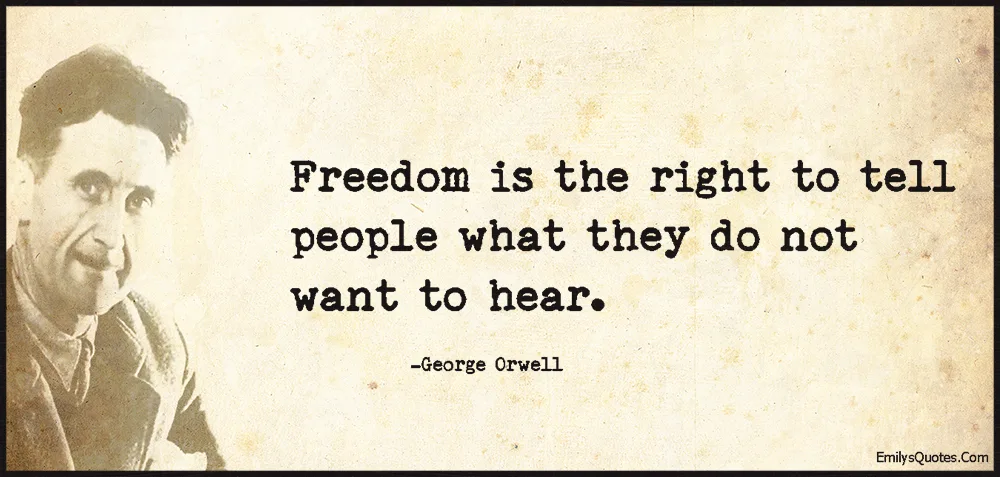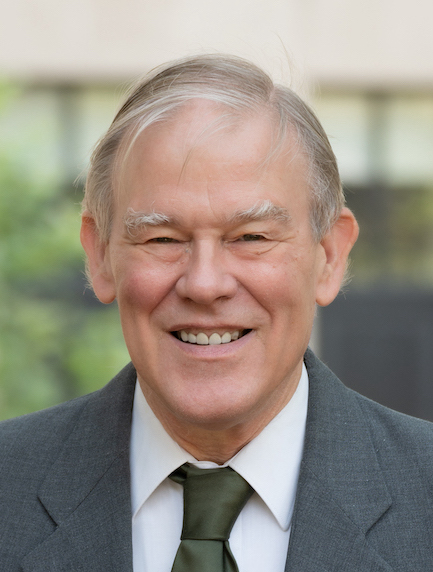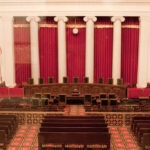Earlier articles reviewed public commentary – largely in briefs to the Supreme Court – concerning the 303 Creative vs. Elenis case, which is expected to be decided by the end of June. The case is crucially important because a negative result – finding that web designer, Lori Smith, must provide web design for same-sex weddings if she expands her business to include web design for weddings – would amount to declaring a right to require compelled speech. Free speech is the one classical liberal doctrine which has so far prevailed against the antidiscrimination regime. This article will attempt to highlight some crucial areas where there are threats to free speech and attempted requirements of compelled speech on LGBT issues. Freedom in these areas will be much more secure if 303 Creative wins its case, and gravely threatened if it is lost.
The main thrust of the case against 303 Creative is to hold that where creative effort is involved in fashioning an individual product, it must be supplied according to the buyer’s specifications, if the buyer is in an antidiscrimination category. That the vendor must express ideas in the product he or she does not believe, or even is opposed to, is irrelevant. Thus, in the (now familiar) baker/florist/photographer cases, a rainbow colored cake, or a cake with the words “support gay marriage,” might be required of a baker. A photographer might be required to supply photography services to a same-sex wedding.
As earlier articles (here, here, and here) have noted, the concept of “gay rights,” or “LGBT rights” essentially conflates a person with their behavior and inclinations. But it is precisely behaviors and inclinations which establish character. By making particular sexual behaviors and inclinations antidiscrimination categories, the state essentially declares them to be an inviolable part of humanity, and any adverse judgment against them a violation of the law where antidiscrimination law applies.
From Civil Rights to the General Police Power of the Law
A negative result in the 303 Creative case – requiring personal expression supporting homosexuality or transgenderism in custom made products – can also be expected to begin the collapse of existing strong free speech jurisprudence based on the First Amendment. It would open the door to requiring speech (or silence) in support of homosexuality and transgenderism. Professional counseling speech against homosexuality or transgenderism are already prohibited in twenty-one states and the District of Columbia. This means professional counselors cannot encourage a sex-confused minor to identify with their biological sex
New laws could likewise prohibit private speech by parents or others against homosexuality or transgenderism. With these laws, the LGBT war against religious doctrine would move from using civil rights legislation, as has been done in the past, to using the general police power of the law. These laws would effectively then be what are called “conversion therapy” laws, found in other Western countries, which do in fact prohibit private speech against homosexuality and transgenderism. They might first apply only to speech directed to minors, as is the case in Germany. They could also define any parental speech against homosexuality or transgenderism as “child abuse,” and be cause for removing children from socially conservative families (as is being attempted by current legislation in California). But ultimately they will prohibit speech against homosexuality or transgenderism generally (as is the case in Canada).
Another area that people will unavoidably have to confront is the required use of “preferred pronouns” (pronouns that are the opposite of someone’s biological sex). This is required increasingly in corporate environments. But in more liberal jurisdictions (such as New York City) the government requires employers to mandate it for their employees. A government requirement is, of course, a violation of free speech doctrine. If the 303 Creative case is lost, it will be an impetus to these laws. Even though they involve the use of words rather than artistic expression, they may well be found constitutional if Colorado prevails in 303 Creative vs. Elenis, although they clearly involve requiring forced speech.
Since transgenderism separates sex from the body, “gender” could mean anything. A consistent application of gender ideology, in which no discrimination or speech against “gender” is legal would effectively be a law of the jungle. In reality, legislatures and courts will mandate particular claimed “genders” as protected classes (currently homosexuality and identification with the opposite biological sex have protected status). And the key to gaining protected status, free from adverse judgment, will be (as has been true in the past) organization, activism, and appeals to personal pain at traditional morality.
The threat to parental authority is strong. As noted above, instruction in traditional sexual anthropology and morality is being regarded as “child abuse.” The Family Acceptance Project at San Francisco State University proposes “education” and “family intervention” and addesses specifically the need to work with “religiously conservative families.” It takes little imagination to see that in California and similar states this type of effort by social workers, pro-LGBT groups, and others will be backed up with the force of the law. This in turn violates the long-standing rule in Pierce vs. Society of Sisters (1925) that parents have the right to “direct the upbringing and education of children under their control,” and that “the child is not the mere creature of the State; those who nurture him and direct his destiny have the right, coupled with the high duty, to recognize and prepare him for additional obligations.” The threat to evangelism is not as immediate, but very much present, since calls to repentance from sexual sin could be interpreted as “conversion therapy.”
As this writer has mentioned in a previous article, the word “conversion” in the term “conversion therapy” was likely carefully chosen. Once a society has become accustomed to prohibiting exhortations to repentance from sexual sin, exhortations to repentance in general could be interpreted as “conversion therapy.” Recall that emotional distress at the implication that one is wrong in one’s life choices (and thus bears “stigma”) has recently become important in arguments for requiring compelled speech. Exclusivist religions (such as traditional Christianity and Islam) threaten unbelievers in their faith with eternal punishment. The doctrine of karma is another religious doctrine that threatens consequences beyond this life for people who violate religious precepts. The advance of the LGBT revolution has depended critically on testimonies of personal agony. How many more testimonies could be gathered of personal agony (and especially the agony of minor children) at the doctrine of eternal torment? With “conversion therapy” laws and the threat to parental custody, we certainly see where “the personal is political” ends. If personal life is a government concern, then the government regulates personal life, and the personal is finally the tyrannical.
The Duty of Christians in Any Regime
What should be decisive against these arguments of personal pain, however, is the fact that the government is not competent to address questions of ultimate reality. Even highly intelligent and informed people disagree on these questions. But it is the individual – each individual – who has to face the prospect of death and giving an account of his or her life. They should have the legal right to live life in accordance with religious precepts, and advocating for the truth of the body of doctrine and practices that they understand to be divine revelation.
Behind “LGBT rights” laws is a philosophy of self-determination that makes what Scripture declares to be grave sin to be understood to be an inviolable part of humanity. Under the free speech regime which has prevailed in recent decades (even against “hate speech” laws promulgated in other countries and favored by the Left) free speech is an exception to antidiscrimination laws. Speech against homosexuality and transgenderism remains legal in the United States, even if discrimination against it is made illegal in the provision of goods and services, housing, and employment.
Expanding speech bans and compulsions in the United States will indeed take time, since past free speech jurisprudence is strong. But the legislation being proposed in California indicates it may be easier to move quickly in this area in more liberal jurisdictions than one might think. Certainly these efforts should be fought. But we must always remember that whatever the outcome of 303 Creative vs. Elenis, or other court decisions and legislation, it is our duty as Christians never to facilitate sin. This is well shown, as this writer has frequently cited, in the Bible, in which Jesus clearly forbids the promoting or cooperating in sin:
“Woe to the world for temptations to sin! For it is necessary that temptations come, but woe to the one by whom the temptation comes! And if your hand or your foot causes you to sin, cut it off and throw it away. It is better for you to enter life crippled or lame than with two hands or two feet to be thrown into the eternal fire. And if your eye causes you to sin, tear it out and throw it away. It is better for you to enter life with one eye than with two eyes to be thrown into the hell of fire.”
Similarly, the Catechism of the Catholic Church forbids facilitation of sin (Para. 1868) :
“Sin is a personal act. Moreover, we have a responsibility for the sins committed by others when we cooperate in them:
– by participating directly and voluntarily in them;
– by ordering, advising, praising, or approving them;
– by not disclosing or not hindering them when we have an obligation to do so;
– by protecting evil-doers.”
And similarly, the Westminster Larger Catechism, question 99, point 5 declares:
“That what God forbids, is at no time to be done; (Job 13:7–8, Rom. 3:8, Job 36:21, Heb. 11:25) what he commands, is always our duty; (Deut. 4:8–9) and yet every particular duty is not to be done at all times. (Matt. 12:7”)
These declarations, both from the Bible and from Christian catechisms, make clear that we are never to sin, which is to disobey God, or to cooperate in such disobedience, which is also sin. They do not vary over time, nor under what regime one happens to live. The outlook for a favorable decision in the 303 Creative vs. Elenis case appeared good at oral arguments in December. Even a favorable outcome would not give full protection against a legal requirement to sin (such as providing accommodations for a same-sex couple at a bed and breakfast establishment). But it would secure the constitutional right not to be required to provide an expressive product, such as a custom wedding cake, for a same-sex wedding.
On the other hand, a negative outcome, denying any protection against supplying expressive products, not only would leave vendors who provide expressive products with no protection (such as bakers, florists, or photographers), but open the door to suppressing speech and requiring speech among counselors (professionals and non-professionals), pastors, and parents on LGBT issues or any others the state wishes. Another major result will be (at least in liberal jurisdictions, and perhaps ultimately, nationally) required use of false (or “preferred”) pronouns. Any restrictions will almost certainly be restrictions on speech along the lines required by Critical Theory (racial, sexual, or another of area where ideologists find “oppression”).
But whatever the outcome, Christians (and in God’s eyes, everyone) are bound to obey him regardless of legal requirements. The narrow gate ahead may be difficult, but it glorifies God, and is the way to life.






Comment by David on June 21, 2023 at 9:07 am
None of the freedoms granted in the Bill of Rights is absolute. A revived Church of the Aztecs would not be allowed to engage in human sacrifice regardless of the First Amendment. Individuals cannot own nuclear missiles despite the second.
When it comes to freedom of speech and the press, things are less clear. This was famously held not to protect “yelling fire in a crowded theater.” Pornography has been held to be unprotected. Libel and slander laws were not abolished by these rights.
Indeed, shortly after the ratification of the Bill of Rights (1791), the Sedition Act of 1798 was passed that criminalized:
“Writing, printing, uttering or publishing any false, scandalous and malicious writing or writings against the government of the United States, or either house of the Congress of the United States, or the President of the United States, with intent to defame the said government, or either house of the said Congress…”
Clearly, the Framers had a rather different idea of what freedom of speech meant than what people imagine today.
Many Western democracies have enacted laws against promoting hatred against groups. This is why many Neo-Nazi and antisemitic works are printed in the US instead of Europe where they might be prohibited. There are also prohibitions of refusal of service to minorities.
Gays are among the last groups to be relieved of persecution. Some people are unhappy with this and claim a religious exemption for their bigotry. I personally think that gender transition decisions should be delayed until adult understanding of its consequences.
Comment by Rick Plasterer on June 21, 2023 at 3:58 pm
David,
Scripture is clear that our first duty is to God, not the state (Acts 5:29). This applies everywhere, including North Korea and Saudi Arabia, where obedience to God might involve a slow and painful death. It applies regardless of what God commands, whether bloodshed (as in the Old Testament wars), or evangelism (under the New Testament).
Although our duty to God is quite independent of government permission, James Madison, the principle author of the First Amendment, acknowledged the primacy of divine commands in the Memorial and Remonstrance. It recognizes that our duty to God is superior “both in order of time, and degree of obligation, to the claims of Civil Society.”
Any government professing religious neutrality must, of course, restrain religiously required action that inflicts material harm (even if the religious actor, by his own faith, is not relieved of the duty, but is guaranteed punishment). But the state should never require religiously forbidden action. There is no one who really thinks it is ever right to take an action understood to be evil. That is the principle of conscientious objection. Some time ago, Christopher Tollifsen argued (https://www.thepublicdiscourse.com/2009/01/100/) for an absolute right of conscience.
Rick
Comment by David on June 21, 2023 at 4:23 pm
Romans 13 1
Everyone must submit himself to the governing authorities, for there is no authority except that which God has established. The authorities that exist have been established by God.
Comment by Rick Plasterer on June 21, 2023 at 4:30 pm
David,
Peter and the apostles (in Acts chapter 5) disobeyed the governing authorities to obey God. The clear meaning is that we are never, under any circumstances to disobey God.
Rick
Comment by Tom on June 21, 2023 at 5:33 pm
Still waiting for homosexuals to sue a Muslim business. I think I will have quite a long wait.
Comment by David S. on June 28, 2023 at 6:03 pm
Yes David, use the age old people who object to the sodomites and effeminate are just bigots trope, AND if the government demands that you must burn incense to caesar, which *checks notes* Daniel and his friends; Peter, Paul, and the Apostles; Jeremiah, Micaiah, and other prophets; and even Jesus himself, when upholding the law of God versus the laws of men (such as healing on the Sabbath) did not do, you must do it false argument.